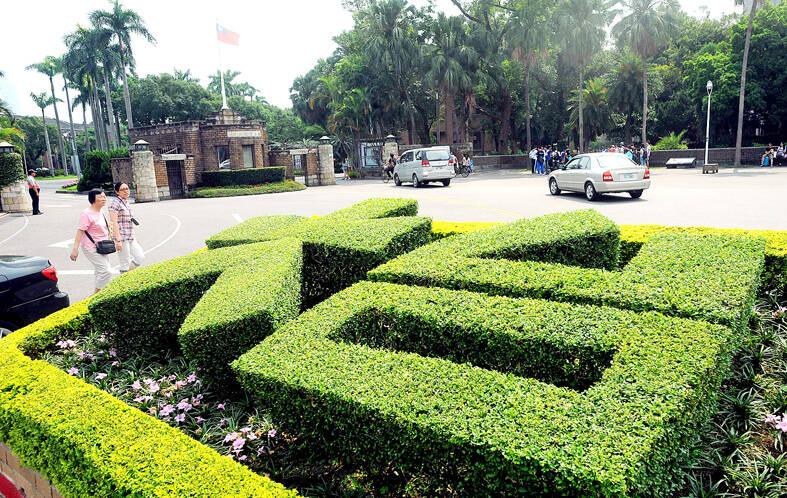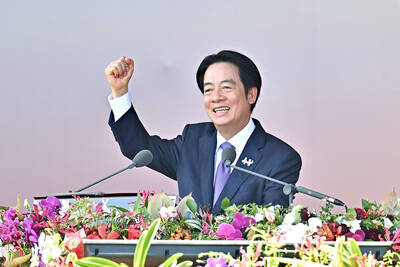Taiwan has experienced its most significant improvement in the QS World University Rankings by Subject, data provided on Sunday by international higher education analyst Quacquarelli Symonds (QS) showed.
Compared with last year’s edition of the rankings, which measure academic excellence and influence, Taiwanese universities made great improvements in the H Index metric, which evaluates research productivity and its impact, with a notable 30 percent increase overall, QS said.
Taiwanese universities also made notable progress in the Citations per Paper metric, which measures the impact of research, achieving a 13 percent increase.

Photo: Lin Cheng-kung, Taipei Times
Taiwanese universities gained 10 percent in Academic Reputation, but declined 18 percent in Employer Reputation, following a survey of 98,000 hiring managers, human resources workers and talent managers who listed their preferred universities when running recruitment drives.
“Taiwan, home to 24 million people, is a cornerstone of academic prowess in Asia, boasting the second-highest concentration of ranked universities per capita in the region in the 14th edition of the QS World University Rankings,” QS senior vice president Ben Sowter said.
“This remarkable feat not only underscores the robustness of Taiwan’s higher education system but also speaks volumes about its regional and global competitiveness,” he said.
Taiwan’s higher education landscape has made notable strides this year, Sowter said, adding that “significant improvements in research impact indicators signal a burgeoning influence on the global academic stage.”
However, Sowter said that the challenges Taiwan still faces, evidenced by its declines in the Employer Reputation and International Research Network indicators, which he said served as a reminder of the importance of fostering stronger ties with employers and diversifying research collaboration.
Sowter highlighted National Taiwan University (NTU) as being renowned for its stellar performance and unwavering commitment to innovation.
NTU, which consistently ranks in the top 10 in Asia, is a testament to Taiwan’s academic prestige, he said.
This year’s edition of the QS World University Rankings by Subject is an independent, comparative analysis of the academic excellence and influence of more than 1,500 universities in 96 countries and territories, across 55 academic disciplines and five broad faculty areas.
NTU appeared in 44 of the 55 subjects evaluated and was the highest-ranked Taiwanese university. It featured in the global top 20 for Classics and Ancient History, and the top 50 for Library and Information Management, Social Policy and Administration, Modern Languages and Sociology.
Other Taiwanese universities featured in the global top 50 were Taipei Medical University (25th, Nursing), National Taiwan Normal University (27th, Education), National Chengchi University (30th, Classics and Ancient History) and National Kaohsiung University of Hospitality and Tourism (38th, Hospitality and Leisure Management).
NTU secured the ninth spot in Asia with 32 entries in the top 100.
The university also shared seventh spot in Asia for its number of top 200 entries, along with the National University of Singapore and Peking University, with all three institutions having 44 entries in the tier.
Taiwan has the second-highest concentration of ranked universities per capita in Asia, with one ranked university per 956,931 people, following Hong Kong, which had one ranked university per 832,401 people.

The Ministry of the Interior (MOI) is to tighten rules for candidates running for public office, requiring them to declare that they do not hold a Chinese household registration or passport, and that they possess no other foreign citizenship. The requirement was set out in a draft amendment to the Enforcement Rules of the Public Officials Election and Recall Act (公職人員選舉罷免法 ) released by the ministry on Thursday. Under the proposal, candidates would need to make the declaration when submitting their registration forms, which would be published in the official election bulletin. The move follows the removal of several elected officials who were

FOUR DESIGNATED AREAS: Notices were issued for live-fire exercises in waters south and northwest of Penghu, northeast of Keelung and west of Kaohsiung, they said The military is planning three major annual exercises across the army, navy and air force this month, with the navy’s “Hai Chiang” (海強, “Sea Strong”) drills running from today through Thursday, the Ministry of National Defense said yesterday. The Hai Chiang exercise, which is to take place in waters surrounding Taiwan, would feature P-3C Orion maritime patrol aircraft and S-70C anti-submarine helicopters, the ministry said, adding that the drills aim to bolster the nation’s offshore defensive capabilities. China has intensified military and psychological pressure against Taiwan, repeatedly sending warplanes and vessels into areas near the nation’s air defense identification zone and across

SENATE RECOMMENDATION: The National Defense Authorization Act encourages the US secretary of defense to invite Taiwan’s navy to participate in the exercises in Hawaii The US Senate on Thursday last week passed the National Defense Authorization Act (NDAA) for Fiscal Year 2026, which strongly encourages the US secretary of defense to invite Taiwan’s naval forces to participate in the Rim of the Pacific (RIMPAC) exercise, as well as allocating military aid of US$1 billion for Taiwan. The bill, which authorizes appropriations for the military activities of the US Department of Defense, military construction and other purposes, passed with 77 votes in support and 20 against. While the NDAA authorizes about US$925 billion of defense spending, the Central News Agency yesterday reported that an aide of US

NATIONAL DAY: The ‘Taiwan Dome’ would form the centerpiece of new efforts to bolster air defense and be modeled after Israel’s ‘Iron Dome,’ sources said President William Lai (賴清德) yesterday pledged to strengthen the nation’s air defense capabilities and build a “T-Dome” system to create a safety net against growing military threats from China. “We will accelerate our building of the T-Dome, establish a rigorous air defense system in Taiwan with multi-layered defense, high-level detection and effective interception, and weave a safety net for Taiwan to protect the lives and property of citizens,” he said in his National Day address. In his keynote address marking the Republic of China’s (ROC) 114th anniversary, Lai said the lessons of World War II have taught nations worldwide “to ensure that